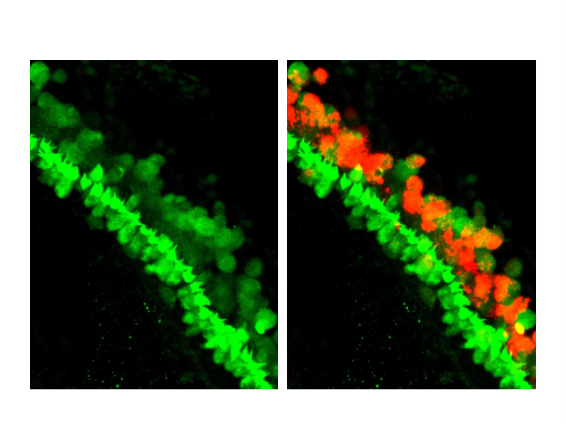By Yizhou Quan and Zheng-Yi Chen
Hearing loss impacts about 48 million Americans and 430 million people worldwide, numbers expected to grow with the aging population. More than 90 percent of these individuals have sensorineural hearing loss, which is caused by damage to the inner ear and the destruction of hair cells responsible for relaying sounds to the brain.
Hair cells cannot be spontaneously regenerated in mammals including humans because, unlike other cells in the body, any remaining hair cells in the inner ear cannot divide and other inner ear cells cannot convert themselves into new hair cells. Developing novel methods to regenerate hair cells in the mature mammalian inner ear has been the “holy grail” in the field.

The regenerated hair cells (Green/Red double positive) were detected in the mouse cochleae after the cocktail/Ad.Atoh1 reprogramming.
The researchers from Mass Eye & Ear used reprogramming, a concept of turning the biological clock backward, in the adult mouse cochlea for hair cell regeneration. They performed single-cell RNA sequencing and determined which of the 20,000-plus genes and pathways within each inner ear with reprogramming effect. They discovered several pathways and genes including Notch, Wnt, cAMP, and Myc synergistically enhancing the reprogramming efficiency. Importantly they found the chemical compounds to activate those signals in the inner ear.
The researchers then combined the chemical compounds into a drug-like cocktail. They delivered it to the inner ear of an adult mouse with damaged hair cells, followed by the delivery of the gene Atoh1 (a master gene for hair cell formation) into the cocktail-treated inner ear. Remarkably, they found this drug-like cocktail/Atoh1 combination reprogramming the inner ear cells, which leads to the regeneration of new hair cells. The study identifies a strategy by a clinically-relevant approach via small molecules to regenerate hair cells in wildtype mature mammalian inner ear, which can be developed for future clinical study.
Yizhou Quan is a research fellow working in the inner ear hair cell regeneration program in the lab of Zheng-Yi Chen, Department of Otolaryngology-Head and Neck Surgery, Eaton-Peabody Laboratory, Massachusetts Eye and Ear Infirmary and Harvard Medical School.
Zheng-Yi Chen is an Associate Professor of Otolaryngology, Harvard Medical School and Mass. Eye and Ear.
Learn more in the original research article:
Reprogramming by drug-like molecules leads to regeneration of cochlear hair cell-like cells in adult mice.
Quan YZ, Wei W, Ergin V, Rameshbabu AP, Huang M, Tian C, Saladi SV, Indzhykulian AA, Chen ZY. Proc Natl Acad Sci U S A. 2023 Apr 25;120(17):e2215253120
Also featured in HMS News.
News Types: Community Stories
